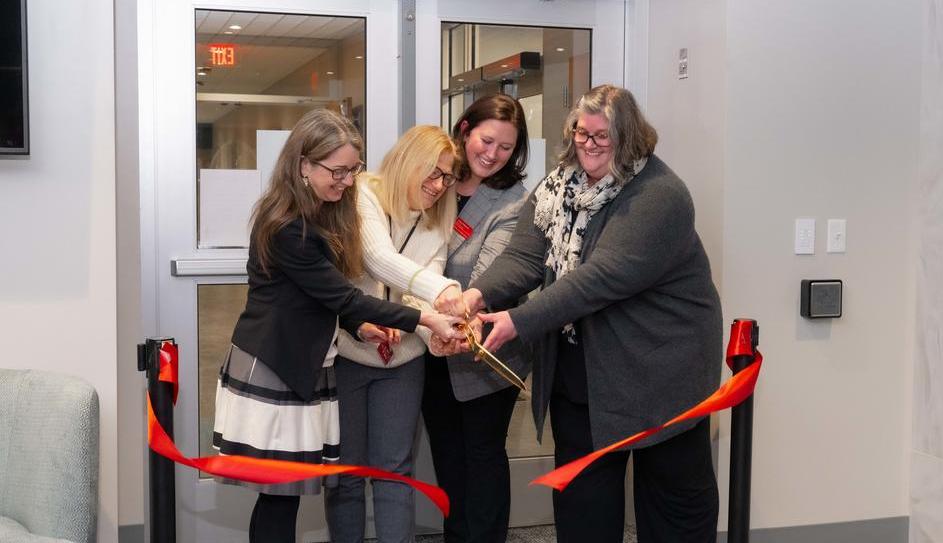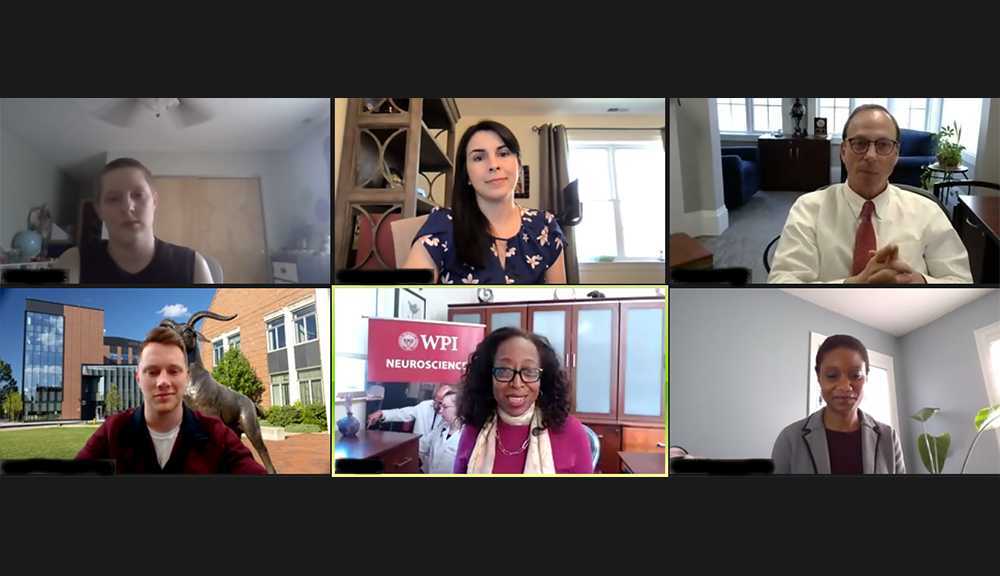WPI has appointed Charlie Morse the Dean of Student Wellness, a position created to align the university’s holistic vision and its resources for health and well-being on campus. Morse was previously Associate Dean and Director of Counseling in the Student Development and Counseling Center (SDCC). He will provide leadership and support for Student Health Services, the SDCC, the Office of Accessibility Services, and the Center for Well-Being.
In his new role, Morse will ensure that the mission and goals of each independent office flow smoothly to provide students with coordinated and collaborative support. He will report to Philip Clay, Senior Vice President for Student Affairs, and will work closely with student-facing departments and academic leadership across campus.
He will lead the ongoing development of campus wellness approaches, encompassing empathic and compassionate care and support for a diverse student population through prevention, education, and outreach in partnership with departments and offices including Student Affairs, Academic Affairs, Office of Diversity, Equity, and Multicultural Education, and other student-facing offices.
He will also identify emerging trends relating to student wellness, including student health, mental health, and disability support, with a particular eye on how student wellness impacts the individual college experience, as well as the community as a whole. He will oversee service improvement initiatives including the opening of WPI’s new Center for Well-Being and new space for Health Services and Counseling.
"With data indicating that, nationally, the prevalence of student mental health issues is over 50 percent, we need to recognize that student distress is a population-based concern, and we need to develop strategies and interventions that reflect this understanding," said Morse. "Everyone at WPI has a part in making the campus community more supportive and responsive to our mutual well-being. I’m excited to be in this new role supporting WPI campus community health, with the new Center for Well-Being as a catalyst for change toward wellness for everyone. We will all benefit from living, learning, and working in a campus environment that values community wellness.”
Morse has been with the SDCC since 1993 and became Director of Counseling in 2005, and Associate Dean in 2009. He is a Licensed Mental Health Counselor (LMHC) and received his MA in Counseling Psychology from Assumption College. He has expertise in Acceptance and Commitment Therapy (ACT), which helps students move towards their values with openness and acceptance.
“WPI built wellness into our 2021-2026 strategic plan to harmonize and amplify the ongoing work in our student-support offices across campus. The establishment of the Center for Well-Being is a centerpiece of the strategic plan, and Charlie was responsible for developing the vision for the Center,” said Clay. “He was the ideal person to fill this new role—not only because of his depth of experience in student mental health and counseling, but also because of his insightful leadership in support of the WPI community over the years. He has been instrumental in preparing WPI to recognize and respond to the dynamic mental health needs of the college-aged population. During the pandemic, in addition to managing the SDCC and counseling students directly, Charlie helped WPI build a public health infrastructure and a health team that formed the foundation of our COVID response. And last year, his guidance during an extremely challenging and sad time on our campus was steady, open, heartfelt, and forward-looking.”
Said Morse, “My goal is to enhance an environment in which students feel seen and supported, where they are able to build their own foundation for success—no matter how they define success—and where they can acquire and grow the emotional, social, and intellectual tools needed throughout life.”
Sabrina Rebecchi, LMHC, has been appointed Director of the SDCC, succeeding Morse.
Mental Health Implementation Team Enters Phase Two
In addition to his new role as Dean of Wellness, Morse will co-lead the next phase of the university’s Mental Health Implementation Team with Steve Kmiotek, Chemical Engineering Professor of Practice; and Rachel LeBlanc, Associate Vice President of Strategic Initiatives. The three follow Philip Clay, Senior Vice President for Student Affairs, and Lt. Col. Ronald Bashista, Director of Emergency Management, who co-led MHIT since it was created in March 2022.
MHIT has been operationalizing numerous recommendations from the Mental Health and Well-Being Task Force. The Task Force, formed in fall 2021, gathered input from students, faculty, staff, parents, and alumni—as well as from external experts including the Jed Foundation and Riverside Trauma Center—and summarized recommendations to address stressors and better support mental health and well-being for the community as the campus struggled with a number of student losses, against a backdrop of the pandemic and a national mental health crisis among young people.
According to a Fortune survey of 1,000 college students conducted by The Harris Poll in June 2022:
-
Three in five (60%) college students reported being diagnosed with a mental health condition by a professional, most commonly anxiety and depression. (This is significantly higher than 48% in the general population reporting similar diagnoses.)
-
The pandemic only exacerbated student mental health problems nationwide:
-
Nearly half reported that their overall mental health worsened since the pandemic.
-
About 56% have experienced worsening stress
-
53% reported heightened anxiety
-
45% cited increased symptoms of depression
MHIT is composed of a number of sections—each of which includes students, faculty and staff—tasked with specific initiatives aimed at infusing mental health and well-being into all aspects of campus life, making self-care a priority for all. MHIT meets weekly to report on progress and to discuss any needs or roadblocks. As progress is made, the teams will continue to evolve, much as the Coronavirus Emergency Response Team (CERT) did over the course of the pandemic, to phase sections in or out as needed. Morse, Kmiotek and LeBlanc are currently working with Clay and Bashista to determine the areas of focus and makeup of the next iteration of MHIT.
To date, WPI is investing more than $1.4 million annually on MHIT-related efforts (not including capital expenditures). While a fuller update will be forthcoming, some recent and ongoing activities include the following:
Student Life
-
Produced and distributed (in print and online) Gompei’s Guide to WPI, a student-developed booklet providing tips and resources for succeeding at WPI
-
Identified/labeled gender-inclusive restrooms in all academic buildings on campus.
-
Established new student identity centers: Lavender Lounge (LQBTQIAP+) and Center for Black Excellence
-
Added crisis support information to the back of new WPI IDs for quick reference.
-
Added a Student Activities Office staff member focused on late-night programming to expand offerings; enhanced programming throughout the week
-
Added Office of Diversity, Inclusion, and Multicultural Education staff member focused on religion and spiritual life to expand Collegiate Religious Center programs and services.
-
Examining strategies to reduce stress related to housing selection process
-
Offering faculty and staff incentives to dine at Morgan Dining to allow for student connection
-
Opened new South Village Student Center, featuring additional dining options and gathering spaces
-
Hosted multiple activities fairs in August to support student access to clubs and organizations in a format that was less overwhelming than the prior single massive Activities Fair
-
Added full-time Care Team manager to Dean of Students Office staff
-
Hired 3 additional permanent staff members in the Housing & Residential Experience Center
-
Enhanced student leader training for Program Ambassadors (PA), Community Advisors (CA), and Resident Advisors (RA) to highlight how to refer students to campus resources and make mental health referrals.
First-Year Experience
-
Re-imagined New Student Orientation to include more social/networking opportunities, mental health training, programs focused on transitioning to college.
-
Hosted 10 pre-orientation Welcome Experience Days in the summer to support students/families and create early connections
-
Reworked course registration process for first-year students; Academic Advising registered students directly after individual meetings with student/family
-
Reviewed for-credit PE requirement to include wellness opportunities
-
Coordinating offerings for preventive behavior/health support and education, including Kognito training, Get Inclusive training
-
Enhancing peer-mentoring programs for new students
-
Reviewing foundational STEM course offerings
Academics
-
Reworked Academic Calendar to incorporate Wellness Days in each term
-
Reviewed for-credit PE requirement to include wellness opportunities
-
Launched Educator Exchange document launched to provide tools for faculty to use throughout the year to support students, including ideas for discussing syllabus, expectations, office hours/contact, flexibility and student-self care
-
Reassessing roles and use of MASH tutors, Tas, PLAs to better meet student need
-
Established testing center and hired proctor to better accommodate make-up tests
Programs, Training & Services
-
Opened Center for Well-Being (in temporary space in Unity Hall); permanent space in Morgan Wedge to open in B Term; Center is fully staffed
-
Launched Kognito for all students, faculty, and staff as part of a comprehensive mental health and suicide prevention education initiative
-
Established programming model and implementation plan for Wellness Days; first is September 23
-
Expanding mental health and suicide prevention programs to provide students, faculty, and staff with tools to deepen their learning: Recognizing and Responding to Student Distress (RRSD); Question, Persuade, Refer (QPR); and Student Support Network (SSN)
-
Trained students to work in Center for Well-Being as Peer Well-Being Ambassadors and ProjectConnect facilitators
-
Offering Koru Mindfulness courses for PE credit for undergraduate students and as part of wellness programming for faculty, staff, and graduate students
-
SDCC coordinating with appropriate campus partners to provide mental health services and trainings that address the needs of our LGBTQIAP+, BIPOC/ALANA, international, and neurodiverse communities
-
Piloted psychoeducational workshop session for trans students through SDCC; additional sessions to be offered throughout academic year
Staff & Faculty
-
Established Staff Council; members elected by staff vote.
-
Provided summer work hours and four-hour time-off block May through August
-
Finalized remote/flexible work policy
-
Updated employee tuition benefits:
-
Eligibility waiting period shortened from 3 years to 6 months
-
Tuition remission/reimbursement now includes PhD programs
-
Dependent tuition benefit extended to up to 6 years for accessibility purposes
-
Established clear and transparent salary increase distribution method
-
Reviewing benefits and compensation
-
Launched employee exercise programs (Walking Challenge, lunchtime yoga in A Term)
Communications
-
Developed/continuing Be Well Together web pages to house resource information
-
Launched Center for Well-Being web pages
-
Updated SDCC web pages for easier use
-
Supported Gompei’s Guide to WPI production/distribution
-
Enhancing WPI Mobile app for fuller use by all members of the community
-
Established student Slack group for greater student input on comms
As part of her co-leadership of MHIT, LeBlanc will continue to monitor and support all budgetary requests and operational and logistical needs, as she had while serving as the MHIT Strategic Initiatives Liaison.
In addition, Stephanie Pasha, Assistant Vice President of Strategic Donor Outreach, serves as Parent Liaison and meets regularly with WPI Strong, a group of parent volunteers, to help keep families apprised of the university’s resources and engaged in supporting their students.

